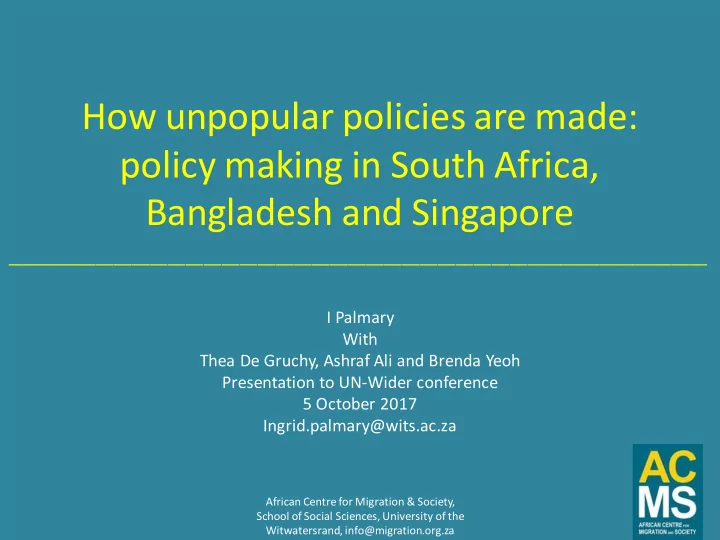

How unpopular policies are made: policy making in South Africa, Bangladesh and Singapore ______________________________________________________________________________ I Palmary With Thea De Gruchy, Ashraf Ali and Brenda Yeoh Presentation to UN-Wider conference 5 October 2017 Ingrid.palmary@wits.ac.za African Centre for Migration & Society, School of Social Sciences, University of the Witwatersrand, info@migration.org.za
Background to Migrating out of Poverty ______________________________________________________________________________ Migrating out of Poverty Research Programme Consortium focuses on the relationship between internal and regional migration and poverty in Africa and Asia. It is funded by the UK’s Department for International Development and coordinated out of the University of Sussex. www.migratingoutofpoverty.dfid.gov.uk African Centre for Migration & Society, School of Social Sciences, University of the Witwatersrand, info@migration.org.za
Dilemmas of policy change in the global South ______________________________________________________________________________ • Why and how does policy change? • Northern based theories don’t quit fit – Presumptions of influence not evidence based (knowledge-oriented and problem-oriented assumptions) – Resource poverty, institutional weakness, politicised policy contexts (Vanyoro 2015). • Protective migration policies are largely unpopular • But strong demand to see research uptake into policy African Centre for Migration & Society, School of Social Sciences, University of the Witwatersrand, info@migration.org.za
Methods (a rough sketch) ______________________________________________________________________________ • Qualitative using process tracing • Stakeholder mapping • Document analysis (varied) • Key informant interviews • Limitations: recall bias, access • All 3 case studies tested a combination of 3-Is framework and ACF African Centre for Migration & Society, School of Social Sciences, University of the Witwatersrand, info@migration.org.za
Background to the case studies Bangladesh ______________________________________________________________________________ • Domestic Workers Protection and Welfare Policy (DWPWP) (Refugee and Migratory Movements Research Unit, University of Dhaka) • Regulates and protects domestic workers excluded from the labour Act • Female and migrant workforce • Clear coalitions (Sabatier, 2014). • Shaped by human rights debates, international conventions African Centre for Migration & Society, School of Social Sciences, University of the Witwatersrand, info@migration.org.za
Singapore ______________________________________________________________________________ • Mandatory day off policy for migrant domestic workers (Asia Research institute, National University of Singapore) • Ageing population, high formal employment • Exclusion of MDW from Employment Act • Strong state but also activism, international reputation and better conditions for MDW in other countries African Centre for Migration & Society, School of Social Sciences, University of the Witwatersrand, info@migration.org.za
South Africa ______________________________________________________________________________ • Trafficking in Persons Act (African Centre for Migration & Society, University of the Witwatersrand) – 2 clear coalitions – Also international influences (NGOs and conventions – Shaky evidence and weak connection between research and policy – High popular and political commitment African Centre for Migration & Society, School of Social Sciences, University of the Witwatersrand, info@migration.org.za
Conceptualising policy change ______________________________________________________________________________ • Early focus was on networks or institutions • Assumed rationality • Sabatier, Jenkins – Smith and Muller share “The goal of establishing the importance of the dynamics of the social construction of reality in the shaping of historically specific and socially legitimate frames and practices” ( Surel, 2000: 495). • 3-Is+N was most relevant adding from ACF and Risse (1999) • Most still assume too great a degree of evidence based policy making African Centre for Migration & Society, School of Social Sciences, University of the Witwatersrand, info@migration.org.za
Findings: 6 factors impacting policy change ______________________________________________________________________________ 1. The nature of the policy being made – Protective, vulnerable groups – Nevertheless unpopular – Gendered and sometimes “private” – Question about whether regulation was appropriate – High public interest African Centre for Migration & Society, School of Social Sciences, University of the Witwatersrand, info@migration.org.za
Findings: 6 factors impacting policy change ______________________________________________________________________________ 2. Who is the policy for? – Poor, migrant, women – Emphasis on morality and creation of moral panics – Unaffected by international or internal migration – Economic costs and benefits and connection to skilled / unskilled movement African Centre for Migration & Society, School of Social Sciences, University of the Witwatersrand, info@migration.org.za
Findings: 6 factors impacting policy change ______________________________________________________________________________ 3. Who are the role players? International actors – Long-term local activism with international activism as • trigger International reputation matters • Conventions seem to matter less (didn’t speed up • policy development) Which women? – Affected women were not advocates • Impacted on the advocacy messages • African Centre for Migration & Society, School of Social Sciences, University of the Witwatersrand, info@migration.org.za
Findings: 6 factors impacting policy change ______________________________________________________________________________ 3. Who are the role players cont …. – Coalitions Were formed in all cases • Lacked expertise on policy drafting • – Civil servants Own investments • Invisible force • African Centre for Migration & Society, School of Social Sciences, University of the Witwatersrand, info@migration.org.za
Findings: 6 factors impacting policy change ______________________________________________________________________________ 4. The positions taken – Moral / ethical with support from legal / human rights discourse – Those against emphasised feasibility, expense – Concessions are inevitable African Centre for Migration & Society, School of Social Sciences, University of the Witwatersrand, info@migration.org.za
Findings: 6 factors impacting policy change ______________________________________________________________________________ 5. Contestations over knowledge – Problematic use of research – Focus was on abuses – Loose understanding of evidence – Research was contested – Research was passively consumed African Centre for Migration & Society, School of Social Sciences, University of the Witwatersrand, info@migration.org.za
Findings: 6 factors impacting policy change ______________________________________________________________________________ 6. The political environment – Took approximately 10 years for policy to change – Relationship between NGOs and policy makers – Ethos of the state (permanent State and the role of bureaucrats) African Centre for Migration & Society, School of Social Sciences, University of the Witwatersrand, info@migration.org.za
Conclusions ______________________________________________________________________________ • Need to attend to the relationship between global and local processes • 3-Is works as checklist with adjustments (an emphasis on where to look rather than what causes change) • ACF was too rigid but useful when used selectively African Centre for Migration & Society, School of Social Sciences, University of the Witwatersrand, info@migration.org.za
Recommend
More recommend